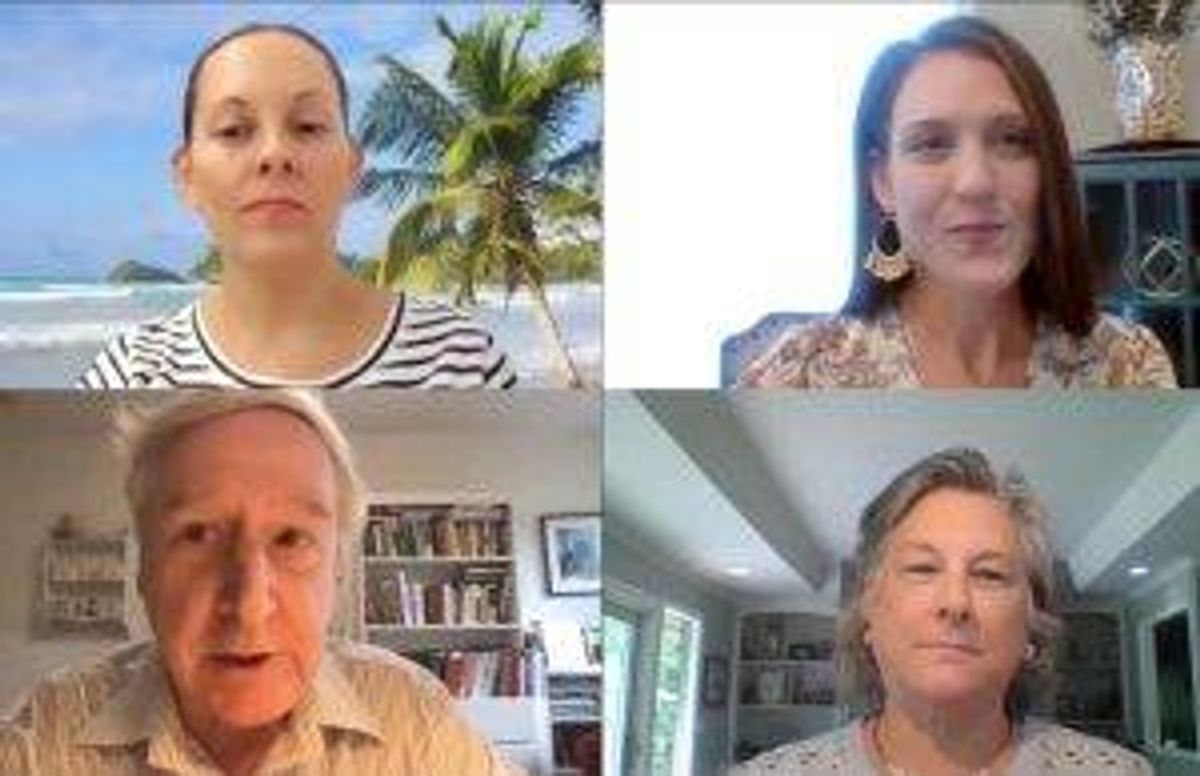Clever Ways Senior Housing Has Kept Residents Engaged During the Pandemic
Creative thinking from three execs in a recent webinar on the topic
When Senior Living Foresight, a website for senior living community developers and operators, asked if I’d volunteer to host its April 24 Virtual Summit panel: How Senior Housing Is Keeping Residents Engaged in the Pandemic, I agreed. But I was a little dubious about the premise.

After all, we’re well aware of the COVID-19 problems some long-term care communities, their residents and families have been dealing with the virus’ spread; the inability of adult children to see their parents and the temporary halt to congregate dining and activities. As Senior Living Foresight publisher Steve Moran wrote in a wrap-up of the summit:“COVID-19 is hell for senior living.”
But after hearing the session’s panelists describe creative ways their businesses have recalibrated for the pandemic to excite, entertain and energize residents — sometimes, with real challenges — I came away pleasantly surprised. Also, I’m hopeful that these new ways of engaging residents in their 60s, 70s, 80s and 90s will continue and expand when the coronavirus fades.
A quick caveat: My panelists (and many summit speakers and attendees) represented independent living and life care retirement communities. So their residents tend to be healthier than those in nursing homes.
“We decided to actually Zoom to our residents. And I’m not going to say that’s been an easy journey,”
My panelists were Sara Kyle, director of resident experience at Holiday Retirement Senior Living Communities, which house more than 30,000 people across the country; Kelly Stranburg, wellness director at Mather and Theresa Perry, corporate director of hospitality and wellness services at Acts Retirement-Life’s 26 communities (full disclosure: Acts Retirement-Life is a sponsor of Next Avenue).
Our Commitment to Covering the Coronavirus
We are committed to reliable reporting on the risks of the coronavirus and steps you can take to benefit you, your loved ones and others in your community. Read Next Avenue's Coronavirus Coverage.
Here’s how they answered my three questions about how they’ve engaged residents during the pandemic and expect to in the future:
What forms of engagement have you implemented for your residents during COVID-19?
Kyle first talked about what she and her colleagues stopped doing. “The whole calendar activities that we typically go off of — you could basically just toss it in the trash because it wasn’t going to work anymore,” she said.
Offering virtual web chat and conferencing services, like Zoom, has become a key way to talk to, and with, residents as well as to offer them instruction and entertainment.
“We decided to actually Zoom to our residents. And I’m not going to say that’s been an easy journey,” said Stranburg. ‘You can’t force tech on people, right?”
Initially, she said, Zoom “seemed a little scary, because we were so curious how many of our residents would actually embrace this. Where were they with their comfort when it comes to technology? And what we discovered is: shame on us.”
In fact, Stranburg noted, “every single week, we see our [Zoom] adoption numbers by our residents tick up.” Now, she added, “we’re offering a variety of exercise programs, mindfulness opportunities, art lectures and poetry groups.”
Sometimes, Mather is reaching out to lecturers and performers who’d been part of its programming before COVID-19. “We’re figuring out ways to embrace their skillsets and talents that our residents love and bringing them into this Zoom world, if you will,” said Stranburg.
Perry echoed this (Acts uses Microsoft Teams, not Zoom), adding that staffers are helping lead the way through YouTube.
“We are definitely leaping into the virtual world as well,” she said. “We have created different ways for our staff to do videos through YouTube… When you have twenty-six communities and thirty fitness staffers, the only way you’re going to connect is through videos, because of the small classes you can have.”
Perry noted that “we have reached more people through virtual fitness than we had in the past.” Some classes are live. “Now we’re taking it to the next level, using our resident portal, and we are making the fitness videos available to do anytime they want.”
One of the panel’s attendees messaged that their community’s Zoom Bingo had gone from 22 people to 100 in two weeks — 25 of the 100 were on screen, 75 played using their phones.
The Touchtown video community engagement platform came up frequently as a huge help. “Touchtown has done a fabulous job of providing us with videos that we can upload to the in-house television, which is the channel [residents] have in their homes, which is important to them,” said Perry.
Stranburg mentioned that, in certain cases, residents who’ve embraced the new technologies during the pandemic have persuaded others to join in. She called this “the power of influence.” A resident who was first resistant might say: “My friend down the hallway called me and they were like, ‘Oh you need to do this with us. It’s really fun,’” Stranburg said.
“We have to continue to explore both sides, technology as well as non-technology for our residents."
And, she added, “I also think the influence of family has helped. ‘Cause most certainly a lot of the residents I’ve spoken with have shared that they have done FaceTime and Zoom with a family.”
For those refusing to try the technology, some communities have launched phone groups. “They’ve been having conversations, book clubs, basically anything you can think of,” said Perry.
At Mather, Stranburg said, they use “telephone topics,” where anyone can call into the general phone line at a scheduled time to talk about the prearranged topic. Coming up: “10 tips to live well.”
Also recommended: The Institute on Aging’s 24-hour, toll-free Friendship Line, for non-emergency emotional support calls (800-971-0116).
Then there are what Perry called “boredom busters” — puzzles and games her communities hand out every week that can be done in the residents’ homes. “We have to continue to explore both sides, technology as well as non-technology for our residents,” she said.
One problem, however, has been engaging residents with hearing or cognitive issues.
What are some of the best practices you’ve discovered during the pandemic?
“Well-being calls; we call it a concierge service,” said Perry. “We had not done this before. It’s all of our staff calling our independent residents on a daily basis, seven days a week. Basically, we’re just checking in to make sure they’re all right. We’re making sure they have groceries, that they have medications, that they’re communicating with their families and friends. And how we can connect them if they need any help.”

This service also helps draw residents closer to staffers. Sometimes, when a person gets the call, Perry said, “they’re actually answering the phone saying, ‘Hi, Teresa. How are you today? I’m excited that you called me again.” Added Perry: “We’d never anticipated this.”
Stranburg said: “What I’ve really taken away from [the pandemic] is the value in making sure we continue to reinforce communication expectations.”
Kyle reflected with this: “It’s interesting what you do in crisis that you think, goodness, why didn’t we do that earlier?” One of those things Holiday Retirement began is a Bridging Generations website, where volunteers across the country are matched with residents and sign up to be buddies, communicating by phone or email. The volunteers can be any age.
Also, Kyle said, “we’ve gone to hallway activities. The doors of the hallways are absolutely six feet apart, so it’s the perfect spacing. We’re finding that people who never would come down to group exercise love hallway exercise. I saw some broomball going on.”
The pandemic has also shown senior housing operators the hidden talents of some of their staff.
“I didn’t realize we had a classical opera singer,” said Perry. “She has been creating videos for us through YouTube. She explains the opera first and then she sings it. It’s gorgeous.”
When Acts delivers food to residents each night, they add notes from children to their dinner bags.
Some Acts communities have been creating a senior housing version of American Idol. “We call it Acts idol. I love that,” said Perry. After staffers compete for three weeks, residents pick the winner. Next up: “the residents will do this with their talent,” said Perry.
There have also been some successful ideas just to brighten residents’ moods — what Kyle calls “small moments of surprise and delight.”
When Acts delivers food to residents each night, Perry said, they add notes to their dinner bags. “The one thing you’ll hear from the residents is that they get excited about the dinner meal coming because there’s going to be something exciting inside,” said Perry.
Holiday Retirement puts a small flower on dinner trays, along with a note from a staffer. “We’ve had some really emotional connections between staff and residents that have come through pretty big,” said Kyle.
What do you think will be embraced and continued beyond COVID-19?
“The young lady that’s doing the opera? She says she can’t wait for the day that she can actually do it in person, in front of everybody,” said Perry. “I think that would be something we should be tapping into. And hopefully, one day, we can have an audience again and have everybody get back together.”


